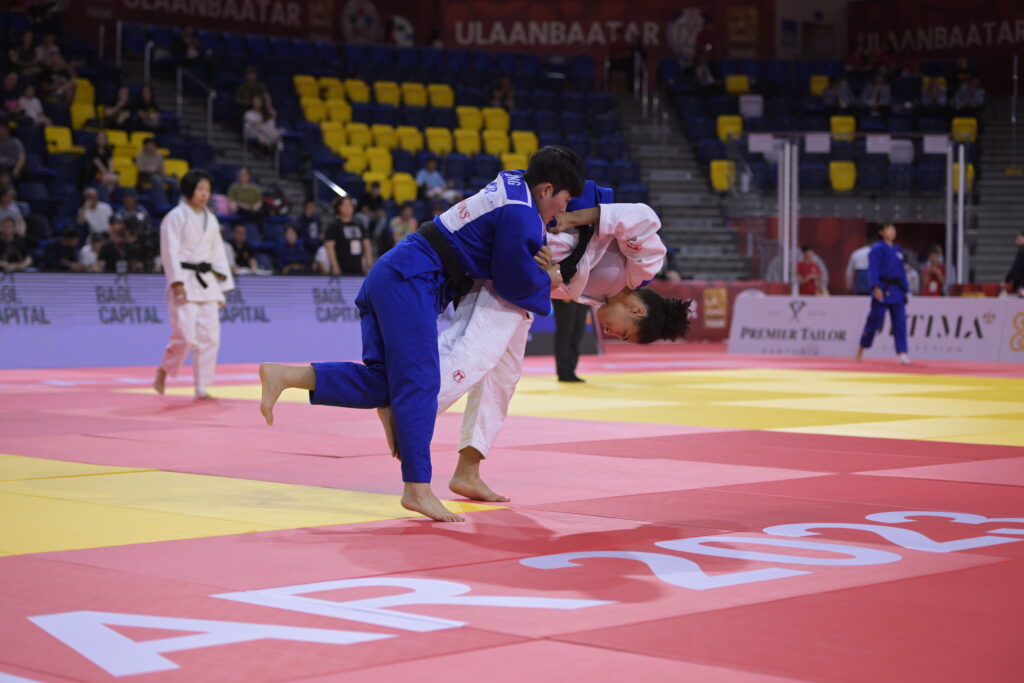The start of the new school year in September is an ideal time to embark on new activities, and judo offers many advantages to those wishing to begin a new sporting adventure. In this article, we present 5 good reasons to start judo this fall. From the development of physical and mental health to the acquisition of essential skills, judo is a discipline that offers a multitude of benefits.
1. Improve your physical condition
The first of the 5 good reasons to start judo is to improve your physical condition.
Judo is a sport that offers many advantages for improving your physical condition. With regular practice, you’ll notice positive changes in your strength, endurance, flexibility and coordination.
Judo involves the whole body, helping to strengthen muscles and develop balanced musculature. Throwing techniques require the use of both upper and lower limbs, strengthening arm, leg, back and abdominal muscles. Workouts also include specific muscle-strengthening exercises, such as push-ups, squats and sit-ups, which help improve overall body strength.
In addition to physical strength, judo also promotes endurance and cardio. Intense combat and repetitive exercises during training increase your ability to sustain effort over a prolonged period. This translates into greater physical stamina and the ability to recover more quickly from intense exertion.
Regular judo practice also promotes flexibility and range of motion. Throwing movements, falls and control techniques require good flexibility. Stretching during warm-ups and post-workout stretches helps to improve the flexibility of joints, muscles and tendons, helping to prevent injury and improve the quality of movement.

Finally, judo strengthens coordination and balance. Throwing techniques require precise coordination of arm, leg and whole-body movements. In addition, balance exercises and falling practices help develop a better sense of balance. This is essential for maintaining a stable position in combat.
2. Developing self-confidence
Judo is a discipline that fosters the development of self-confidence on many levels. By practicing judo, you expose yourself to constant personal challenges, enabling you to boost your self-esteem and gain confidence.
First and foremost, judo involves learning new techniques and gradually mastering them. At first, you may feel awkward or uncertain. But with time and practice, you’ll develop solid technical skills. This tangible progress in learning techniques and executing them effectively will give you a sense of personal achievement and boost your confidence in your abilities.
In addition to the technical aspect, judo also challenges you in combat. Facing an opponent on the tatami requires self-confidence and self-assurance. Through these confrontations, you’ll learn to manage stress, stay calm and focused, and make quick decisions. Every battle you win or challenge you meet will give you an extra dose of self-confidence.

Judo also promotes self-confidence through the progression of the belt system. Each time you reach a new belt level, you are rewarded for your commitment and progress. This sense of accomplishment and recognition boosts your confidence in your abilities and motivates you to keep improving.
Away from the mat, the self-confidence you develop through judo is reflected in other aspects of your life. You’ll be better able to take on challenges. Decision-making will be easier, and so will interacting with others with confidence. This self-confidence is a valuable skill that can help you in your career and personal life.
3. Acquire self-defence skills
One of the most compelling reasons to start judo this fall is the opportunity to acquire effective self-defense skills. Judo isn’t just a sport, it’s also a system of self-defense that teaches practical techniques for protecting yourself in real-life situations.
Judo focuses on using the opponent’s strength against himself. Throwing techniques, such as ippon seoi nage (shoulder throw) or ogoshi (hip throw), enable judokas to unbalance and throw a bigger, stronger aggressor using their own strength against him or her. These techniques are based on principles of physics and body mechanics, making them accessible to everyone, regardless of physical strength.
In addition to throwing techniques, judo also teaches arm locks (kansetsu-waza) and chokes (shime-waza), which can be used to neutralize an opponent in a dangerous situation. These techniques make it possible to control and subdue an aggressor without having to resort to excessive violence.

By learning self-defense skills in judo, you’ll also develop greater confidence. And better management of stressful situations. You’ll learn how to identify potentially dangerous situations, assess threats and react appropriately. Judo also teaches the importance of vigilance andobservation of the environment. This can help you avoid conflict and protect yourself proactively.
Importantly, judo also emphasizes responsibility in the use of self-defense skills. Judokas are encouraged to use their skills only in self-defence and to avoid any abusive use of force.
4. Work on discipline and respect
Judo is deeply rooted in the values of discipline and mutual respect. This dimension of judo is one of the reasons why it is so highly regarded throughout the world.
First and foremost, judo instills discipline right from the start. Judokas learn to follow strict rules, both on and off the tatami. During training sessions, judokas must comply with their teacher’s instructions and respect established schedules. Judo discipline also means respect for training partners, opponents in combat and referees in competition.
Mutual respect is a fundamental value of judo. Judokas learn to respect each other, whatever their level of experience or physical strength. The traditional salute (reigi) at the beginning and end of each training session symbolizes this respect. It’s also customary to salute your opponent before and after a fight.
By practicing judo, judokas learn to control their emotions and channel their energy in a positive way. Discipline and respect are essential to maintaining a safe and harmonious training environment.
eyond the tatami, the discipline and respect taught by judo have repercussions in everyday life. Judokas learn to respect the rules established in other areas of their lives, such as school, work and family. The discipline they acquire on the tatami is also reflected in their ability to set goals and show the determination to achieve them.
5. Mental development and stress management
To conclude these 5 good reasons to start judo, mental health and stress, an increasingly important subject. One of the best reasons to start judo in September is the emotional fulfillment and stress management it can bring.
Judo provides a space where practitioners can release their emotions and manage stress in a healthy way. During training sessions, judokas are encouraged to channel their emotions and energy into the execution of techniques. This releases accumulated stress, lets off steam and makes you feel more relaxed and balanced.
By practicing judo, judokas also learn to manage stress during fights and competitions. They are confronted with intense, competitive situations where self-control is essential. Judo teaches breathing and relaxation techniques to help control emotions, stay focused and make thoughtful decisions under pressure.
What’s more, judo fosters emotional development by encouraging self-confidence and self-esteem. Judokas learn to set goals, work hard and see their progress over time. Each new technique mastered or competition won boosts self-confidence and brings personal satisfaction.
Judo is also a supportive environment where judokas help and motivate each other. Coaches and practice partners offer moral support and encourage judokas to overcome challenges. This positive group dynamic enhances emotional growth and creates a sense of belonging.
To conclude, don’t wait any longer! With these 5 good reasons to start judo in September, there’s no room for doubt! Find out more about the clubs near you – they’ll be delighted to welcome you.


